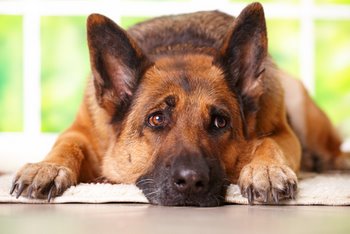HOW CAN WE HELP?
6a - 7p Monday - Friday
6a - 2p Saturday
Mountain Time
PHONE
1-877-738-7237
FAX
1-866-777-1434
MAIL
Pets Best
2323 S Vista Ave. Ste. 100
Boise, ID 83705
My Question
First Name
Last Name
Policy (optional)
Phone
Best Day
Best Time
- Pet Insurance
- Blog
- Do animals grieve the loss of another pet?

Losing a pet is one of the hardest parts about having one. The furry animals become part of the family and take up a piece of your heart. After a loved one is gone, life can change drastically, not only for you, but also for other pets in the house.
Scientists are still uncertain exactly how pets perceive emotions, and if they are aware of emotions. Certainly simple emotions such as fear, pleasure and hunger are well documented in animals, but more complex emotions, such as grief are the subject of debate. In addition, we are uncertain how much dogs and cats understand about death.
Regardless of how animals actually perceive emotions, it is well documented that the sudden loss of a companion pet can be difficult for the remaining animal, causing some behavioral changes along the way. Obviously the loss of a pet is difficult for people too, and it is possible that animals may perceive their owner’s sadness, in addition to their own.
Signs Your Pet is Grieving
1) One of the most drastic changes when one animal in a multi-animal household dies is the change in the structure of the ‘pack’ hierarchy. Dogs and cats have very well defined social roles, with leaders and followers. Without the companion, your remaining pet’s role may be ill-defined. A normally more submissive dog may suddenly have no one to follow, and a leader may have no one to lead. This can manifest as behavioral changes; your pet isn’t sure how to act any longer.
2) You may notice a decrease in social interaction, such as hiding or segregating from the family. A decrease or increase in appetite, which can lead to weight loss or gain, can also occur. Some dogs may pace or even look like they are ‘searching’ for their lost loved one. Vocalizing excessively may occur in dogs; urination and grooming habits may change in cats.
How to Help Your Grieving Pet
1) Helping your pet adjust to the loss may have the added benefit of helping you cope as well. It is important not to ‘reward’ sulking or brooding behavior, but rather engage the pet in a new activity. Positive training is a beneficial way to help your pet learn its new position in the family and move on from loss. It can create a bond between you the handler and your dog. It also creates clear communication between you; this bond and communication make it easy for the pet to look to you for leadership. In fact, sometimes in this situation, a dog’s personality will actually blossom after the loss of another dog, allowing them to recognize a different more confident role.
2) A training class that uses positive methods or private lessons from a trainer may help you to learn the skills you’ll need. Dogs can keep learning for their entire lives, this new knowledge can make a grieving dog more confident and sure of itself. A confident dog that knows it’s ‘role’ is generally happier and easier to be with.
3) Another thing that is important to helping a grieving dog cope is increasing the activities it loves to do. For example, a dog that loves to play fetch at the park might benefit from a few more fetch sessions than you normally do. It could be simple things like extra brushing, or getting to ride in the car while you run errands, or maybe a new squeaky toy. Even just a few more minutes of play time can help a dog adjust to life without its companion, and may make you feel better too!
Should You Get a Second Pet to Fill the Void?
Getting another dog is controversial and if it’s not the right time for you in terms of your grieving, free time, or finances, don’t do it. Dogs can adjust to being without canine companions in time, and some will even blossom. Just like people, pets will deal with loss in their own way. If you feel your dog needs other canine companions, but aren't ready for a new dog, try the dog park, a doggy play date with a friend that has dogs or a training class. This will give you, your family, and your other pet time to grieve and rediscover their place, and eventually, open your hearts to love again.
If you are concerned that your pet’s health is suffering from their loss, call your veterinarian.